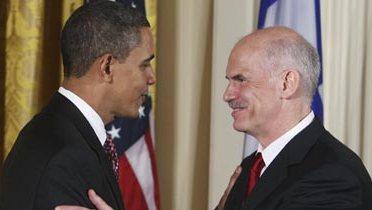Greek political leaders have not had much cause for celebration in the last four years. Last night’s victory by President Obama was no different— it did not lead to dancing in the streets of Athens. But it certainly was a cause of major relief.
Across the political spectrum, Greek leaders have seen President Obama as someone who has urged European leaders to not force a Greek exit from the eurozone.
By comparison Greeks did not know Mitt Romney very well. And what they did know, they did not like. The prospect of a victory by Mitt Romney caused great anxiety across the political spectrum in Greece— even among Greek conservatives.
Time and time again during the campaign, Mitt Romney went out of his way to warn Americans that if they did not get their fiscal house in order, they would be heading towards a crisis that he called “the road to Greece.”
His comments led many Greeks to fear that a Romney presidency would promote a message of fiscal austerity, rather than one of growth and solidarity. That was particularly a concern as Greece has begun to convince many European counterparts that austerity is a one-way street leading to a break-up of the eurozone.
Even Greece’s leftist parties were relieved. In the past, Greek leftists have used a caricature of American capitalism to stoke fervor against free-market democracy. Yet in the current circumstances, Greece’s leftists have come to fear a situation where Greece was even further marginalized in Europe.
Now the focus shifts away from the United States, and back to Greece. All Greek political leaders know that what an American president does or says will only have a marginal effect of what is important right now for Greece.
Greece’s leaders know that their fate lies in their own hands. Greece’s own actions are most critical to their future— especially getting their own fiscal house in order and reforming the excessive regulations that constrict their economy. Greece’s own right-of-center government is taking these steps right now, in exchange for interim support from the rest of Europe.
Of course, Greeks also are aware that this European support will continue to shape its future— particularly aid from counterparts in Germany, the Netherlands, and Scandinavia, which have been most reluctant to help.
In fact, the relief that many Greeks feel at an Obama victory is one based on the largely constructive role the Obama administration has played with these European nations, as well as with international bodies such as the International Monetary Fund.
Obama’s quiet diplomacy on this front has already led to a decline in anti-American sentiment and improved US-Greek relations— especially when compared to the last four decades.
So for the next four years, Greece will have an American president who knows and understands why Greece’s role as a member of the European Union must be preserved.
The president’s team knows this is not only in Greece’s interest but also in America’s interest. During the first Obama term, several fledgling American economic recoveries were stunted by setbacks in European recovery efforts.
What remains uncertain for Greece’s leaders is how much President Obama can help to encourage the rest of Europe to support Greek reforms. Will a re-elected Obama lean even harder into Germany and northern Europeans to provide a clear signal that Greece will not be left behind?
And if he does so, how public should those efforts be? In Europe’s convoluted internal politics, if Obama is too public in pushing Germany and others to support Greece, it could backfire and undermine those efforts. In that case, Greeks might need to be wary of Americans bearing gifts.
For now at least Greeks will breathe a sigh of relief and consider those questions tomorrow.









Commentary
Op-edObama Win Is a Gift for Greeks
November 8, 2012